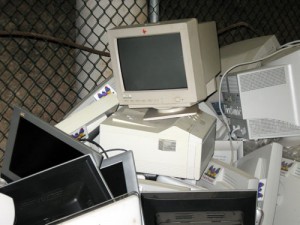E-waste recycling on campus
Courtney Brodbeck
The Signal Staff
In most homes in the U.S. today you can find at least one television, printer, computer, cell phone and radio. The majority of homes offer multiple electronics. These devices eventually break down or need to be upgraded with the latest technology. What do you do with them after they have run their lifespan?
Computers and related components contain hazardous materials that can leech into the community’s water supply including: cathode ray tubes, circuit boards, batteries, and mercury switches contain hazardous materials, such as lead, cadmium and chromium.
Recycling is one of the best options for human safety and the environment. The Environmental Protection Agency encourages the recycling of electronic waste, or e-waste as it is commonly known, to protect the overall well-being of the public.
“Electronic waste contains hazardous materials, especially lead in electronic circuitry, which if improperly disposed, can pose a risk to public health and the environment,” said David Bary, spokesperson for the EPA. “Recycled e-waste not only reduces solid waste sent to landfills but allows for the reuse of lead and other materials and greatly diminishes human exposure to hazardous wastes.”
At the University of Houston-Clear Lake, electronic equipment that has been permanently retired from service is disposed of in accordance with state property accounting policies and equipment that is not computer-related is sent to public auction. The state provides three options for recycling electronic equipment: trade-in for purchases of similar equipment, transfer to a Texas public school, or transfer to the Texas Department of Criminal Justice Computer Recovery Operations.
“UHCL’s preferred method is the trade-in option because trade allowances reduces the final cost of new equipment,” said Greg Scoggins, asset management coordinator.
The equipment is traded back to the vendor after the three-year warranty has expired and dispose of the computers.
“After it goes back to the vendor, they ensure us that they take every step possible to make certain the equipment is treated environmentally friendly,” said Jerry Jones, director of technical services at UHCL.
Houston has a program that allows residents to recycle outdated or broken electronics to avoid the dangerous toxins found in computers and televisions.
The new pilot program is called Electronic Scrap Recycling and the items accepted by Houston waste managers are monitors, televisions, printers, keyboards, scanners, VCR’s, CPU’s, cellular phones without batteries, fax machines, telephones headsets and other small consumer electronics; however, only a five-piece maximum amount of electronic scrap is allowed per trip.
To prevent environmental exposure of hazardous material, residents can drop off the electronic scrap at the Westpark Consumer Recycling Center, located at 5900 Westpark, or the Environmental Service Center, located at 11500 South Post Oak.
Some manufacturers also accept electronics for recycling.
Dell will take any make or model free of charge when purchasing a new computer, but they charge $15 when not buying a new computer. HP offers an online hardwire recycling service charging from $13 to $34 per item.
Another option is to donate working electronics to various charities and receiving a tax-deductible receipt.
California passed the Electronic Waste Act in 2003. Since then the California Integrated Waste Management Board has collected 700 million pounds of electronic waste by promoting conscious thinking before consumers buy.
“Even the efforts of one person can make a big difference in the environment,” said Beatriz Sandoval, public information officer with the California Integrated Waste Management Board.



Comments are closed, but trackbacks and pingbacks are open.